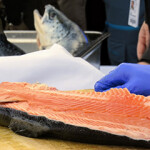Kingfish Maine files its first permit application for proposed RAS

Kingfish Maine, a subsidiary of Kats, the Netherlands-based The Kingfish Company, will formally file its first pre-permitting application for its proprietary land-based aquaculture facility in Jonesport, Maine.
The Maine Pollutant Discharge Elimination System Permit (MEPDES) application is “one of the more critical permits required for the operation of a land-based farming facility,” according to the company.
“Our team has been actively engaged with Jonesport residents for the last 18 months, outlining our plans and identifying any concerns residents and lobstermen may have,” Kingfish Maine Operations Manager Megan Sorby said in a press release.
On Tuesday, 7 July, Kingfish Maine said it will file for a MEPDES permit by early August. Kingfish Maine’s recirculating aquaculture system (RAS) facility is being designed to produce 6,000 to 8,000 metric tons of yellowtail annually upon completion, it said. This permit evaluates the facility’s discharge to ensure that Kingfish Maine will maintain the water quality of the area based on the location of the discharge point and the contents of the effluent water, according to the company.
The application will outline Kingfish Maine’s solids and nutrient filtration system, as well as its heat recovery process, The Kingfish Company CEO Ohad Maiman said. The technology will be the same used at the company’s original RAS facility in Zeeland, the Netherlands, giving Maine officials an existing model to study.
“Our Maine facility will be designed with the same advanced technology we use at our Kingfish Zeeland facility, which operates in a nature reserve,” Maiman said. “We are investing in an advanced filtration and heat exchange system that will allow us to reclaim heat from the water, therefore preventing temperature rise in the bay. Our designers and engineers listened to the concerns of residents and are also minimizing the pipe footprint to just below half-a-mile.”
Sorby said in discussions with local residents, the intake and discharge pipes, as well as the temperature of the water released into Chandler Bay, were their biggest concerns.
“We are confident this application addresses those concerns in a matter that will please everyone who lives and fishes in this area,” Sorby said.
Kingfish Maine will outline its MEPDES application and host a discussion on the project in a public meeting on Tuesday, 21 July, in Jonesport.
“Kingfish Maine is looking forward to continued conversations and close cooperation with the residents of Jonesport regarding the permitting process,” it said.
In the company’s notice of intent to file for a permit, it included additional information about an economic impact study being conducted by the University of Maine to determine the project’s financial benefit to the community. Preliminary data from the study shows a potential value-added multiplier impact of USD 46 million [EUR 40.7 million], and a projected employment of 70 full-time positions once the facility reaches full production.
Photo courtesy of Kingfish Maine






Share